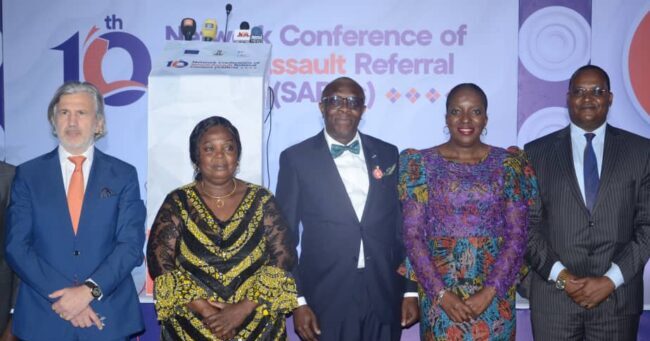The European Union (EU) has urged all stakeholders; government ministries, departments and agencies, private sector actors, civil society organizations, and religious and traditional institutions to unite in tackling sexual and gender-based violence (SGBV) against women and girls across Nigeria.
The EU emphasized that a collaborative and integrated approach is essential for a sustainable solution to eradicate violence against women and girls.
Speaking at the 10th Network Conference of Sexual Assault Referral Centres (SARCs) in Abuja, Zissimos Vergos, Deputy Ambassador of the EU Delegation to Nigeria and ECOWAS, stated that gender-based violence is not solely a “women’s issue” but a societal challenge requiring collective action.
Vergos highlighted the importance of prevention and protection, noting, “Speaking openly about gender-based violence still poses a significant risk for survivors. The EU supports creating an environment where women and children are encouraged and empowered to break the silence.”
He reiterated the EU’s commitment to promoting gender equality and strengthening support systems, ensuring survivors’ voices are respected and heard.
Vergos lauded the success of Sexual Assault Referral Centres (SARCs) established since 2013, which now number 47 across 22 states in Nigeria, having supported over 35,500 survivors. These centres offer free medical, counseling, and legal services to survivors.
Despite these achievements, Vergos stressed that the facilities remain insufficient for Nigeria’s population. He lamented the low prosecution rates for SGBV cases compared to the number of survivors, urging increased access to justice and care.
“The importance of these centres underscores the need for SGBV to remain a top priority for us all,” he said.
Vergos called on the Nigerian government to take greater ownership of the anti-SGBV campaign by increasing funding and equipping designated institutions to meet survivors’ needs.
Hajia Imaan Sulaiman-Ibrahim, Minister of Women Affairs, represented by Mrs. Friya Bulus, emphasized the ongoing campaign to sustain advocacy, raise awareness, and mobilize stakeholders to end violence against women and girls.
Similarly, Lateef Olasunkanmi Fagbemi, Attorney General of the Federation and Minister of Justice, represented by Bola Odugbesan (Esq.), described SGBV as one of Nigeria’s most pressing challenges. He called for renewed commitments from stakeholders to achieve societal transformation in the fight against SGBV.
Dr Roba Sharamo, Director for Africa and West Asia at the International Institute for Democracy and Electoral Assistance, underscored the link between addressing SGBV and fostering democracy and good governance.
He stated, “A society hostile to more than half its population—women—cannot thrive. Addressing SGBV is not only a human rights and justice issue but also integral to democratic progress.”
Sharamo also acknowledged that SGBV affects men and boys, emphasizing that this growing concern should not detract from addressing violence against women.
The EU reaffirmed its dedication to eradicating SGBV, emphasizing that this commitment is crucial for rebuilding humanity and fostering a gender-sensitive society in the 21st century.
ALSO READ FROM NIGERIAN TRIBUNE
EU inaugurates second cohort of youth sounding board in Nigeria
Get real-time news updates from Tribune Online! Follow us on WhatsApp for breaking news, exclusive stories and interviews, and much more.
Join our WhatsApp Channel now
